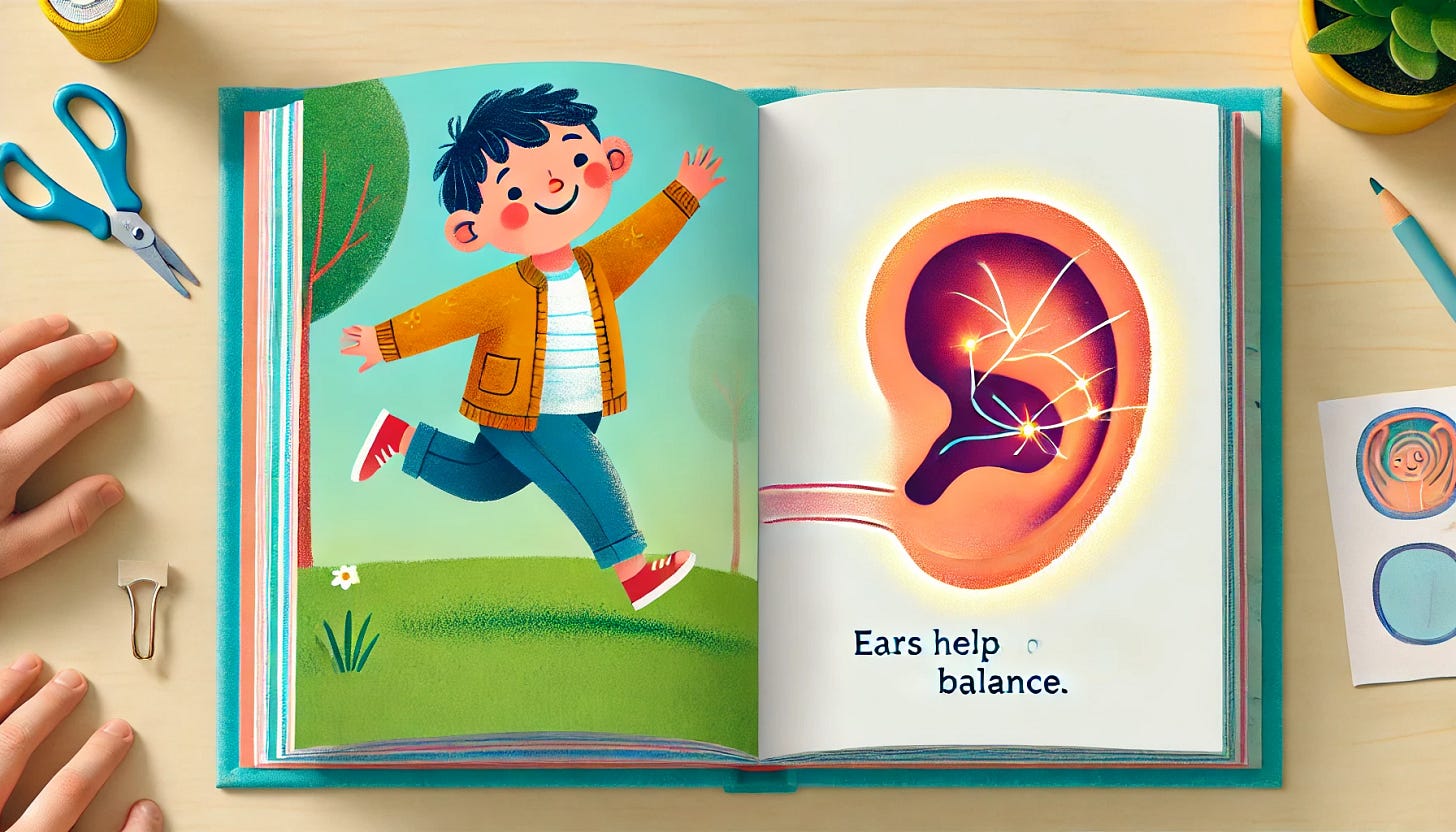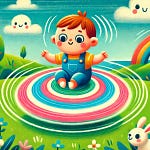What Is Balance?
Balance is the ability to stay upright and steady when you’re standing, walking, jumping, or moving. It helps you:
✔️ Walk without tripping
✔️ Ride a bike without falling
✔️ Dance without tipping over
✔️ Stand still without wobbling
Without balance, even simple things like standing up straight would be hard to do!
Your brain, muscles, eyes, and ears all work together to keep you balanced. But today, we’re going to talk about how your ears help the most!
Hello my friends!
For a quick note, welcome to Tidbits with Titus, a podcast and newsletter where we tackle the big, curious questions kids ask every day in fun, bite-sized ways! I’m Alexander Titus, but I go by Titus. I’m a scientist, adventurer, and a huge fan of making science, technology, and life accessible to all ages. From “How does electricity work?” to “What are taxes?” and even “Why is the sky blue?” I’m here to dive into these wonder-filled questions with engaging stories and simple explanations that spark curiosity and make learning a joy. This effort is all about creating a space where families can learn together, discover the magic of the every day, and find thoughtful ways to explore the world’s big mysteries. Let’s make curiosity a family tradition—one tidbit at a time!
Just so you know, these podcast episodes are all AI-generated using Google’s really cool NotebookLM technology. That means there are some errors in how words are said, but that is part of the fun!
If your little ones have questions that you want help answering, shoot me an email at questions@tidbitswithtitus.com and I’ll see what I can do!
You can subscribe to the newsletter that has this information as well at tidbitswithtitus.com.
Also please share with anyone you think would be interested. The more the merrier!
Cheers,
-Titus
Inside Your Ears: A Hidden Balance System!
If you touch the outside of your ear, it feels soft and wiggly, right? But inside your ear is a hidden system that helps you balance!
Deep inside your ears is a tiny part called the inner ear. It has a special job—it helps your body know when you’re tilting, spinning, or standing still.
Inside your inner ear, there are three tiny loops that look like little hoops. These are called the semicircular canals. (That’s a big word! Say it like this: sem-ee-SIR-kyoo-lur ka-NALS.)
These tiny loops are filled with liquid and tiny hairs that tell your brain what’s happening when you move.
How Do the Semicircular Canals Work?
Imagine you have a bottle of water. If you tilt the bottle, the water inside moves around, right?
That’s exactly how the liquid in your semicircular canals works!
🌀 When you turn your head, the liquid inside the loops moves around.
🌀 The tiny hairs inside the canals feel the liquid moving and send messages to your brain.
🌀 Your brain tells your body what to do so you don’t fall over!
This system works super fast, so you can move around without even thinking about it!
What Happens When We Spin Around?
Have you ever spun in circles and then felt dizzy when you stopped? That’s because of the liquid inside your semicircular canals!
🌀 When you spin, the liquid inside your ears starts swirling around.
🌀 When you stop spinning, the liquid keeps moving for a little bit.
🌀 Your brain thinks you’re still spinning, even though you’re standing still!
That’s why you feel dizzy—your brain gets confused for a few seconds!
But don’t worry, the liquid in your ears calms down quickly, and then you feel normal again!
Other Parts of the Inner Ear That Help Us Balance
Besides the semicircular canals, there are two other tiny parts of your ear that help with balance:
✔️ The Utricle (YOO-trih-kul)
✔️ The Saccule (SAK-yool)
These parts help your brain know when you’re:
📍 Standing up
📍 Lying down
📍 Tilting your head
They have tiny little crystals inside them that move when you move. These crystals send messages to your brain, so it always knows if you’re upright or upside-down!
It’s like having a built-in balance sensor in your ears!
How Do Our Ears and Eyes Work Together?
Your eyes also help with balance! Your brain uses your eyes to check if the world around you looks steady.
👀 If your eyes and ears agree, your brain knows everything is okay.
😵 If your eyes see one thing but your ears feel something different, your brain can get confused—this can make you feel dizzy!
That’s why it’s harder to balance when you close your eyes—your ears have to do all the work!
Try this fun experiment:
1️⃣ Stand on one foot with your eyes open—pretty easy, right?
2️⃣ Now try standing on one foot with your eyes closed—harder, isn’t it?
That’s because your ears have to work extra hard without your eyes helping!
Why Do We Feel Dizzy on Rides?
Have you ever gone on a fast ride at an amusement park and felt super dizzy afterward? That happens because of your ears!
🎢 On a roller coaster, your body moves up, down, and side to side really fast.
🎢 The liquid inside your semicircular canals sloshes around a lot.
🎢 When the ride stops, the liquid keeps moving, making you feel dizzy!
Your brain just needs a few seconds to catch up and realize the ride is over!
What Happens When Our Balance System Isn’t Working?
Sometimes, people can have problems with their balance system. This can make them feel:
😵 Dizzy
🤢 Nauseous (like they might throw up)
🚶 Wobbly when they walk
Some things that can make balance harder include:
Ear infections – If the inside of your ear gets swollen, your balance can get a little wobbly.
Motion sickness – If your ears and eyes send mixed messages to your brain (like when reading in a moving car), you might feel dizzy or sick.
Inner ear problems – Sometimes, the tiny balance parts in the ear don’t work quite right. Doctors can help with special treatments!
Most balance problems go away quickly, but if someone feels dizzy a lot, a doctor might check their ears to see what’s going on!
How Can We Keep Our Ears Healthy?
Since our ears help with hearing AND balance, it’s important to take good care of them!
👂 Keep ears clean – But don’t put anything inside your ears (no cotton swabs or fingers!).
🦻 Protect your ears from loud noises – Loud sounds can hurt your hearing.
🧣 Cover your ears in cold weather – This helps prevent ear infections.
🏥 See a doctor if your ears hurt – If your ears hurt a lot, a doctor can check them!
Taking care of your ears helps you hear better AND stay balanced!
Fun Facts About Ears and Balance!
🎉 Now that you’re a balance expert, here are some cool facts about your ears!
👂 Your inner ear is smaller than a pea, but it does a HUGE job!
🌀 Some astronauts feel dizzy in space because there’s no gravity to help their balance system work!
🐱 Cats have great balance because their inner ears help them land on their feet!
🐦 Birds also use their ears for balance—they can fly without getting dizzy!
🦦 Otters do flips in the water without feeling dizzy because their inner ears are super special!
Isn’t the human body amazing?
So, How Do Our Ears Help Us Balance?
Your inner ear has special parts, like the semicircular canals and the utricle and saccule, that help you know when you’re moving, tilting, or standing still.
Your ears send messages to your brain about how to stay steady, and your eyes help too!
Without your ears, balancing would be super hard! So next time you ride a bike, jump, or spin around, thank your amazing ears for helping you stay on your feet! 🏃♂️🩷👂
The End!
Now, try balancing on one foot again—does it feel easier now that you know how your ears help? 😃👏














Share this post